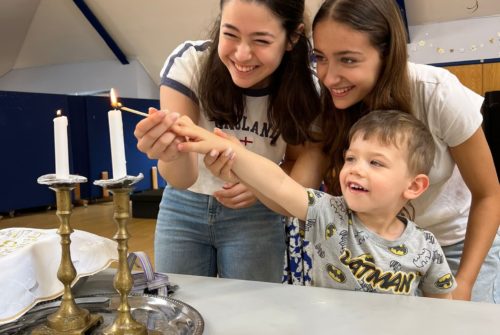Shabbat Chukkat – Interfaith Service
Questions are a bit of a professional hazard in our line of work. This week I had the unparalleled pleasure of being questioned by the year 4 and year 6 pupils at Kenilworth Primary School in Borehamwood, whose inspiring RE teacher, Mrs Alam, is here with us today. I was invited to join them for a mock Shabbat celebration. Their questions ranged from the easier end – do I have a pet and what’s my favourite thing to eat on shabbat (actually that one is quite hard) to the really deeply profound. One student in particular almost took my breath away with her question. ‘Rabbi Debbie, how do you carry on with what you have to do when things are really hard?’
What a question. And in the world of interfaith this year it has been really hard to carry on at times. My answer to the year 6 pupil was that sometimes it’s hard, but the strength of community and the good individuals do within it keeps me going. And the same is true in our special interfaith world. Since October 7th many of my colleagues who have been engaged in interfaith dialogue for years have told me they have been met with a wall of silence. Relationships developed over decades vanished overnight. I feel very lucky that that has largely not been my experience. Many of you here today have in your own ways kept me going, through the darkest moments of the last months, there have been colleagues and friends of all faiths who have reached out, despite possible differences, and we have sat together with our pain. We have refused to dehumanise and we have refused to pretend we don’t care in order to be in conversation. We have taught together, prayed together, and learned together.
Many of you were here back in March when the Faiths Forum for London asked us to host an Iftar. I was worried no one would come, or that it would be too difficult to bring our communities together. But 100 people came and filled the synagogue with conversations about both the mundane and the deeply deeply important. And this year’s Edgware faith walk in June was the biggest yet, allowing local Muslim, Christian, Hindu and Jewish communities to open their doors to one another and to come together locally to explore crucial environmental issues that impact us all.
Even when things are hard and dark, perhaps because things are hard and dark, the need to continue this work and to enhance our understanding of one another is critical.
The passage of torah that we read today, included the death of the Prophetess Miriam, and a return to form for the Israelites with their propensity to moan when the going got tough. And if I’m honest, I can relate. There is something cathartic about having a good moan, being able to share all the stuff that seems to be holding us back or making life hard. But then we have to put it to bed and get on with the job of living life as well as we can. It’s interesting in our portion that for Moses, who has just lost his sister, this episode of moaning seems to push him just a bit too far. The people complain that they want water, God instructs Moses to take his rod and to command it to give water. But Moses doesn’t quite do as told, and instead of speaking to it, he hits the rock with the rod. The result is the same for the people – water comes forth. But for Moses the end result is pretty catastrophic. His punishment for hitting the rock instead of speaking to it, is to be denied the honour of completing his journey with the Israelites who he has led for almost 40 years. He will die before entering the land, because he didn’t, according to the verses we read, trust God enough. What a powerful message of the importance of dialogue over violence, and how easy it can be to allow larger hurts to poison our lives.
Even Moses struggled to retain his composure in the face of endless challenge and opposition. When it gets hard, carrying on can seem daunting. So I was amazed this week to receive a link to an initiative taking place this week called week of goodness. It is an initiative by people who have every reason in the world right now to want to hit the rock, as so many are feeling. Families of those taken hostage, in particular the parents of Hersh Goldberg-Polin, are calling for us all to focus, in the coming week, on doing good in the world. Their hope is that the reward of our good deeds will mean a return of the hostages to their families, and we might all hope that would mean an end to the violence wracking the land. They suggest a range of possible actions, from saying a particular prayer for the hostages at a special life cycle event, to taking on Meat Free Mondays as Hersh is himself a vegetarian. Their call is to flood the world with goodness in the coming week. They are asking us not to hit the rock, but to hold hands with one another and continue this hard work, sometimes pushing against the grains of our communities, and to, in their words, ‘surge goodness into the world’.
For all the children who need to know how we carry on when things are hard, let us all be the role models demonstrating what the world could be. Shabbat Shalom



